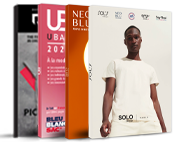Since 1995 ATLANTIS have had a mission: to provide customers with high-quality headwear. We create hats for every type of business, mixing colours, shapes and finishings while featuring our all-Italian attention to style. For us, the hat is not just an accessory, but an extension of an individual’s personality which can be cherished with memories over time. Wearing our hats is also a way to send a message and tell a story. That is why we dedicate passion and care to the accurate manufacturing of our products.
Over the years, that devotion has transformed into something more - a commitment to increasingly responsible production that respects the planet and people. Following a sentiment that was already coursing through our company and observing the effects of climate change, we realised that we had to question how we did things in order to do them differently. Among the first in the merchandising industry, we decided not to stand idly by but rather to give a signal toward change in production and communication.
Our journey began in 2018 - by introducing the first Oeko-Tex® Standard 100-certified models, more eco-friendly dyeing processes and traceability passports for our products - and continued with the design of an overall strategy anchored to the UN Sustainable Development Goals. This led to our introduction of new eco-friendly materials and the release of our first Sustainability Report. Today, we continue to deepen and consolidate our strategy by working on three crucial pillars: product & supply chain, environment and people. By 2025 we want to go bigger, making our collections 100% sustainable while investing in research and development to reduce our environmental impact, taking care of our employees and supporting local communities.
We are people who think about people and for us, being sustainable is not just a business occasion, but a daily behavior. It is not just a responsibility. It’s a revolution. It’s the natural evolution that every company must go through.
Dope dyeing is a dyeing technique typical of recycled polyester fabric. It involves adding color pigment “upstream”, directly to the melted plastic solution before the fiber is made. Unlike traditional processes where yarns are produced and then dyed, with dope dyeing the pigments are trapped inside the plastic after it cools to a solid form, becoming part of the new, strong yarn. With this approach, dyeing can be done by hot transfer without immersion in water.
Organic cotton is cotton grown with low environmental impact methods and products, without the use of pesticides and toxic chemical fertilizers that persist in the cotton itself and in the environment. It comes from controlled and certified organic crops. With this approach, water consumption is reduced, soil fertility is maintained and better working and health conditions for farmers are guaranteed.
.png)

Comments (0)